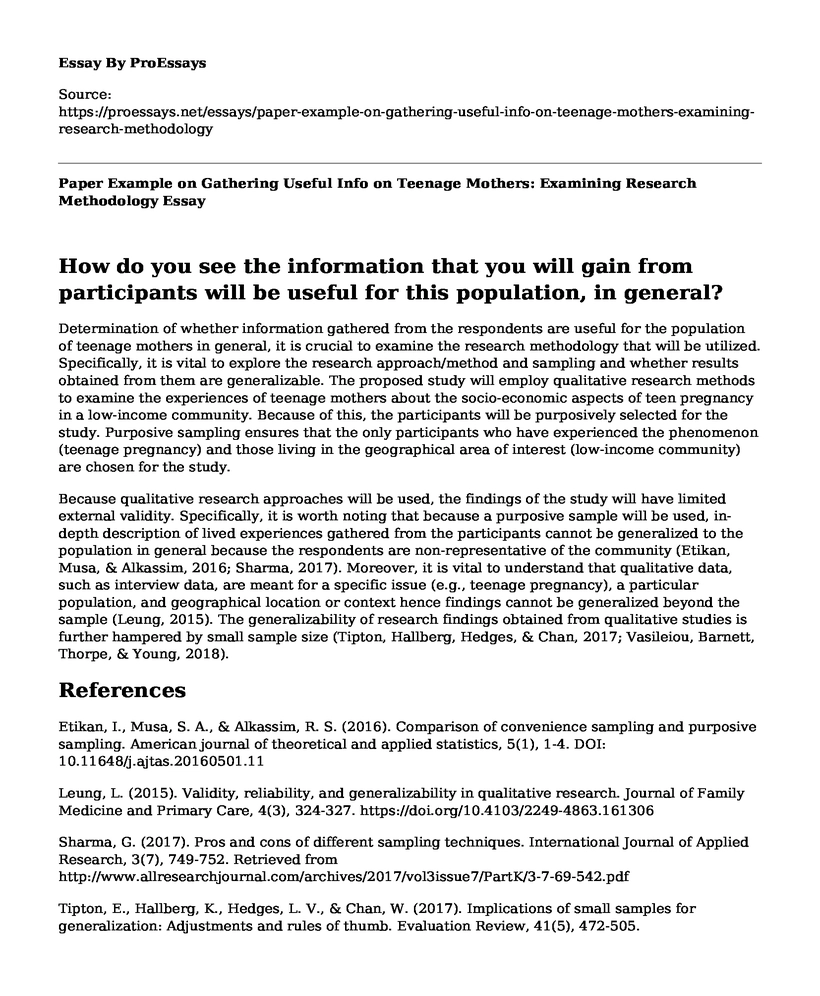How do you see the information that you will gain from participants will be useful for this population, in general?
Determination of whether information gathered from the respondents are useful for the population of teenage mothers in general, it is crucial to examine the research methodology that will be utilized. Specifically, it is vital to explore the research approach/method and sampling and whether results obtained from them are generalizable. The proposed study will employ qualitative research methods to examine the experiences of teenage mothers about the socio-economic aspects of teen pregnancy in a low-income community. Because of this, the participants will be purposively selected for the study. Purposive sampling ensures that the only participants who have experienced the phenomenon (teenage pregnancy) and those living in the geographical area of interest (low-income community) are chosen for the study.
Because qualitative research approaches will be used, the findings of the study will have limited external validity. Specifically, it is worth noting that because a purposive sample will be used, in-depth description of lived experiences gathered from the participants cannot be generalized to the population in general because the respondents are non-representative of the community (Etikan, Musa, & Alkassim, 2016; Sharma, 2017). Moreover, it is vital to understand that qualitative data, such as interview data, are meant for a specific issue (e.g., teenage pregnancy), a particular population, and geographical location or context hence findings cannot be generalized beyond the sample (Leung, 2015). The generalizability of research findings obtained from qualitative studies is further hampered by small sample size (Tipton, Hallberg, Hedges, & Chan, 2017; Vasileiou, Barnett, Thorpe, & Young, 2018).
References
Etikan, I., Musa, S. A., & Alkassim, R. S. (2016). Comparison of convenience sampling and purposive sampling. American journal of theoretical and applied statistics, 5(1), 1-4. DOI: 10.11648/j.ajtas.20160501.11
Leung, L. (2015). Validity, reliability, and generalizability in qualitative research. Journal of Family Medicine and Primary Care, 4(3), 324-327. https://doi.org/10.4103/2249-4863.161306
Sharma, G. (2017). Pros and cons of different sampling techniques. International Journal of Applied Research, 3(7), 749-752. Retrieved from http://www.allresearchjournal.com/archives/2017/vol3issue7/PartK/3-7-69-542.pdf
Tipton, E., Hallberg, K., Hedges, L. V., & Chan, W. (2017). Implications of small samples for generalization: Adjustments and rules of thumb. Evaluation Review, 41(5), 472-505. https://doi.org/10.1177/0193841X16655665
Vasileiou, K., Barnett, J., Thorpe, S., & Young, T. (2018). Characterizing and justifying sample size sufficiency in interview-based studies: Systematic analysis of qualitative health research over a 15-year period. BMC Medical Research Methodology, 18(1), 148. https://doi.org/10.1186/s12874-018-0594-7
Cite this page
Paper Example on Gathering Useful Info on Teenage Mothers: Examining Research Methodology. (2023, Mar 26). Retrieved from https://proessays.net/essays/paper-example-on-gathering-useful-info-on-teenage-mothers-examining-research-methodology
If you are the original author of this essay and no longer wish to have it published on the ProEssays website, please click below to request its removal:
- Essay Sample on the Role of Harvey Bernard Milk in the LGBT Community
- Sexuality in Fairy Tales Essay Example
- LGBT Human Rights Defenders Criminalized in Caribbean Nations: IACHR - Essay Sample
- Representation of LGBT in Arab Cinema - Essay Sample
- Essay Sample on Building Positive Sexuality Views: Age-Appropriate Education
- Research Paper on Psychosexual Development
- Gender & Sexuality - Annotated Bibliography







